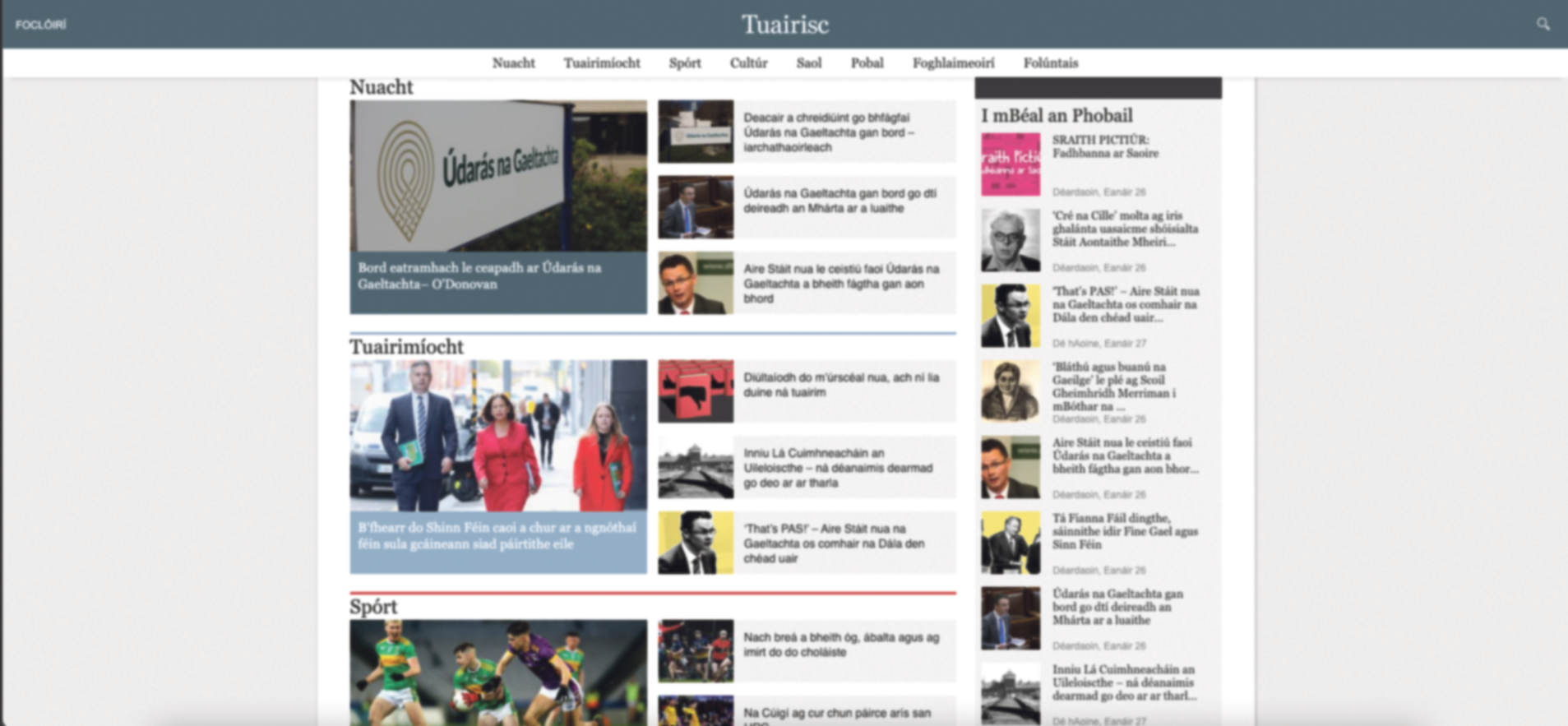I have been wondering recently about the place of news in my life. When I return to my flat after my work, I often sit down to read the news. I’ll scroll through Tuairisc.ie and find discussion of language schemes. News from the Gaeltacht. News on Gaelscoileanna. Changes in Irish-language education. Some articles on Ukraine, or maybe one on climate change or public health.
I then turn to English-language news on RTé and what do I see? Changes to public transport. Political news. Union efforts. Cost of living crises. Inflation. Crimes. Public health issues. Climate change events. Maybe, if I’m lucky, a single reference to the Irish language.
After a while, I developed a habit without fully realising it – I started to read news about the language in Irish and news about almost everything else in English since that was what was available.
News in Irish is only about Irish, to the extent of often gatekeeping local, national, and international news. If you want the “real” news (i.e. any news that is not about the language itself) you often need to read in English.
It’s about time I asked why that is the case.
The easy answer is that there are many fewer Irish-language journalists. But that is only partly true. The reality is that Irish-language journalism has one thing it will always report on first and foremost: anything directly related to the language. But with relatively few writers, this often comes with an exclusion of broader news topics.
Here’s the issue though: Irish-speakers want more than just news about the language. Sometimes they don’t even need that news. They live it. They see it every day. They don’t need a newspaper to tell them there is a crisis of negligence driving families out of their homes in the Gaeltacht. They don’t need reporters to mention that Gardaí and public service have failed entirely in their legal obligation to be fully accessible through Irish. They don’t need a journalist to tell them that Gaelscoileanna have a shortage of Irish-language resources that can teach the same variety of topics as their English-speaking counterparts. They live with those problems every day.
But the broader non-Irish-language community in Ireland does. Those stories all too often miss the headlines, and so when push comes to shove, even those who would be sympathetic to the struggles of the Irish-language community don’t always know what afflicts it. They are never given the chance to care because they are not given the chance to know.
Of course, there are exceptions. But the ratio of the reporting is far, far out of proportion for news topics between Irish and English.
I must admit that I myself have fallen into this trap: to think that when writing in Irish, others want to read news about the language itself. That it’s the most important thing to cover, or that Irish-language journalists have an obligation to report on it. And to want to do that all the more since those topics are rarely covered in English.
I had it wrong. I should have covered those topics in English, given them to the group for which those stories are actually news. The group that might not have known them before. At the time I thought I was expanding and putting out knowledge – in reality I fear I was limiting it.
Because Gaeilge should not only be about Gaeilge. After all, fluent Irish speakers want to read regular news in Irish – not news about the language. And the English-speaking media in Ireland should understand the important issues and advancements in Gaeilge too – it’s all part of Ireland, after all.
This is not, of course, to blame journalists as individuals. It’s about the system – what are they asked to write? What press releases are sent to them, and which do they have to actively search out? Is past precedent used to prevent changes to future reporting? How hard is it to make that change? I cannot answer these. But I can say that some change is needed.
I would therefore ask that journalists run more stories bilingually, rather than exclusively in English. That they specifically emphasise stories about the language in English. And that they place much heavier emphasis on general news in Irish. The system is heavily disproportionate now – but it need not be. That can change.
At the end of the day, it is about making Irish a living language. A language that can be used just like English – the same news, just different words on the page. And if there is less of it – well, that is a problem for another day.
It would only be the first of many steps required to fix the issue. But, as the Irish say, “Túṡ maith, leath na hoibre”. A good start is half the work.








